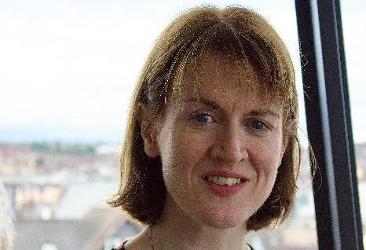
Lecturer, Academic Studies
Rhoda Dullea is Lecturer in Applied Musicianship and Academic Studies at MTU Cork School of Music, where she obtained her Masters in Piano Accompaniment in 2007. She has been active as a piano accompanist since a very young age, and has worked in diverse areas including choral performance, opera and ballet. As an undergraduate student, Rhoda was a member of the Cork School of Music Piano Quintet, which won the Ensemble category of the RTE Musician of the Future competition twice, in 1996 and 1998.
Rhoda has long held an interest in historical musicology, and completed her PhD in musicology at UCC Department of Music in 2005, funded by an Irish Research Council Postgraduate Scholarship. Subsequently, having worked as répétiteur with the Cork Opera 2005 theatre company between 2006-2009, she developed an interest in performing arts education and outreach after becoming involved in Opera 2005's community education programme. In 2009, she was awarded a residency as assistant répétiteur with the “Opera as Theatre” summer programme at the Banff Arts Centre, Alberta, Canada. She then went on to complete a Masters in Education (Arts, Creativity, Education and Culture) at the University of Cambridge in 2013, where she pursued studies in the area of interdisciplinary arts education, with an emphasis on situated learning in the performing arts. She has since published several academic papers on non-formal performing arts programmes for youth, researching the education programmes of prestigious companies such as Opera North, Opera Collective Ireland, Canadian Opera Company, and Ballet Ireland.
Rhoda has a current research interest in historically informed performance practice, and explores early vocal music performance as director and organist for the Gregorian Schola at St Peter and Paul’s Church, Cork, performing Gregorian chant and related sacred Renaissance polyphonic vocal works at the Latin Mass. She also holds workshops in Gregorian chant performance for community choral singers in the Cork region. Her interest in Gregorian chant and historical regional repertories of European chant up until the eighteenth century has led to a research collaboration with Dr Ann Buckley at the Medieval History Research Centre, Trinity College, and Dr Giovanna Feeley (Dublin City University), exploring the engagement of Irish community choirs with the performance of plainchant.
RESEARCH OUTPUTS
ResearchGate Profile: https://www.researchgate.net/profile/Rhoda-Dullea
Publications
Dullea, R. (2022). Facilitating dance in general education through the arts-school partnership: a
case study of Ballet Ireland’s primary school program. Journal of Research in Dance Education (March 2022).
Dullea, R. (2019). Pedagogies of authentic learning in Canadian Opera Company’s opera summer camp programme for adolescents. Youth Theatre Journal, 1-18.
Dullea, R. (2017). Situated Learning in Opera Training: A Case Study of Young Artists’ Experiential Learning in a Professional Opera Production. Theatre, Dance and Performance Training, 8(3), 238-253.
Dullea, R. (2017). Engagement, Participation, and Situated Learning in a Children’s Opera Chorus Program. Journal of Research in Music Education, 65(1), 72-94.
Dullea, R. (2014). Reflections on the British Kodály Academy Spring Course 2014: the importance of kinaesthetic components in the Kodály approach. British Kodály Academy Newsletter (Spring, 2014).
Dullea, R. (2008-09). Populism and folklorism in Central European music pedagogy of the nineteenth and early twentieth centuries. Journal of the Society for Musicology in Ireland, vol. 4, pp. 35-53
Dullea, R. (2 April 2001). The key to the ‘question’: Romani music, Hungarian nationalism and the emergence of a ‘Roma problem’ in Hungarian thought. Central Europe Review
Invited presentations
University College Cork Fuaim Lecture (11-1pm, 15 October 2015): "Proselytising high art among the young: composing opera for children from the 19th century to the present day."
Fox, I. & Dullea, R. (23 September 2011). Interview contribution to Ian Fox documentary radio programme, Franz Liszt: The Lion at the Keyboard (4 parts); Programme 1: The Year of the Comet (1811-1837). The Lyric Feature RTE Lyric FM radio documentary series.
Conference Papers
Society for Musicology in Ireland 22nd Annual Plenary Conference. University of Galway (28 June 2024). “Exploratory Study on Attitudes to Learning and Performing Chant in Irish Choral Educational Contexts” Co-presented with Giovanna Feeley (Dublin City University)
REMA Regional Meeting Ireland National Concert Hall, Dublin (26 November 2022) Presentation: “Learning and performing Gregorian Chant in a Church Choir Context in Ireland” Included as part of a Panel (Dr Ann Buckley, TCD; Michael McGlynn, Anúna): “Medieval Sources in Ireland and what to do with them”.
Children, Youth and Performance Conference. York University, Toronto/Young People’s Theatre, Toronto (June 2022) Project Snapshot: “Bringing dance into general education: Ballet Ireland’s Primary School Program”
Society for Musicology in Ireland Annual Conference. Cork Institute of Technology School of Music (June 2018) “Non-formal teaching approaches in Canadian Opera Company’s opera summer camp programme for adolescents”
25th EAS Conference / 6th European ISME Regional Conference (European Association for Music in Schools). University Mozarteum, Salzburg (April 2017) “Creative teaching approaches in a summer camp opera programme for adolescents”
Society for Musicology in Ireland Annual Conference. University College Cork (June 2015) - "Proselytising high art among the young: composing opera for children from the 19th century to the present day." Roundtable: "Musicology in Progress"
Society of Music Education in Ireland 4th Annual Conference. Cork School of Music, CIT (November 2014) “Situated learning in expert performance contexts: a case study of young artists’ experiential learning in a professional opera production”
Society for Musicology in Ireland Annual Conference. University of Ulster, Magee Campus (May 2010) “Populism and religion in Liszt’s Des Bohémiens et de leur musique en Hongrie.”
Society for Musicology in Ireland Annual Conference. Waterford Institute of Technology (May 2008) “Populism, folklorism and the composition of music for children in the early twentieth century.”
Society for Musicology in Ireland Annual Conference. Mary Immaculate College, University of Limerick (May 2006) “Zoltán Kodály and the ‘gypsy question’ in Hungarian music.”
International Musicological Society 17th International Congress. Leuven, Belgium (August 2002) “Changing symbolism in Hungarian musical nationalism.”
Royal Music Association Annual Student Conference. University of Exeter (December 2000) “Nationalism or exoticism? The Hungarian art music tradition and constructions of ethnic identity.”